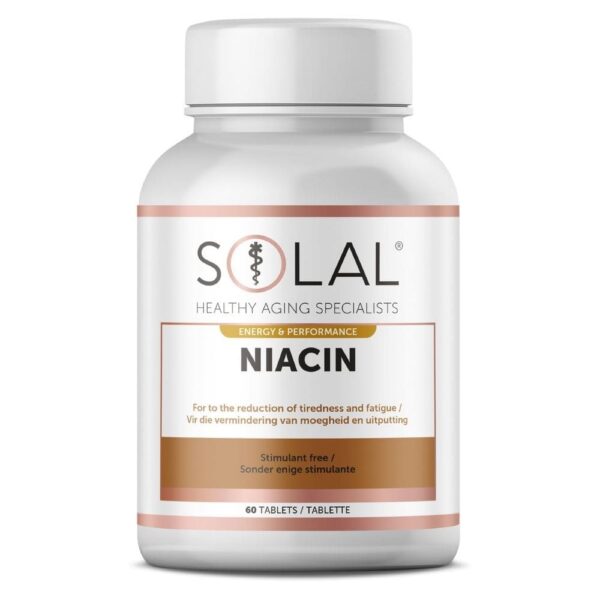Solal Niacin 35MG (vitamin B3 as nicotinic acid) assists the body in metabolising carbohydrates, proteins and fats. It also contributes to normal psychological function and prevents a niacin deficiency, as well as contributing to the reduction of tiredness and fatigue.
How to Use:
Adults:
Take 1 tablet daily, after food.
Niacin often causes red flushing of the skin, especially when consumed on an empty stomach. It is therefore recommended to start by taking a quarter to half tablet daily after food, gradually increasing the daily dose to 1 tablet.
When to Use:
Mornings
Do not use this product if you are hypersensitive (allergic) to any of the ingredients. If you are on any medication or suffering from any medical condition, it is advisable to seek medical advice before starting any new medicine, supplement or remedy. Do not exceed recommended dosages unless on the advice of a healthcare practitioner This unregistered medicine has not been evaluated by the SAHPRA for its quality, safety or intended use.
Surgery: Niacin might affect blood glucose levels. Niacin may interfere with blood glucose control during and after surgery. Individuals should discontinue 2 weeks before elective surgical procedures.
Side Effects
Side effects include flushing, tingling and itching sensations as well as redness on the face, arms and chest. They are usually transient and disappear with continuous use. Other side effects are rare, but include nausea, bloating, flatulence, hunger pains, vomiting, heartburn, diarrhoea, increased sebaceous gland activity, low blood pressure, dizziness, rapid heart rate, irregular heartbeat, and blurred vision. Very high doses (greater than 3000 mg daily) might cause jaundice and elevated serum transaminases. Such high doses should be discontinued if liver function tests rise to three times the upper limit of normal.
Interactions
Allergies: Niacin may exacerbate allergies by causing histamine release.
Diabetes: Niacin can interfere with blood glucose requiring an adjustment of antidiabetic agents.
Gout: Large amounts of niacin can precipitate gout.
Peptic ulcer disease: Large amounts of niacin might activate peptic ulcer disease.
Pregnancy and Breastfeeding
Safety during pregnancy and whilst breastfeeding has not been established.





 If you purchase this product you will earn
If you purchase this product you will earn
Reviews
There are no reviews yet.